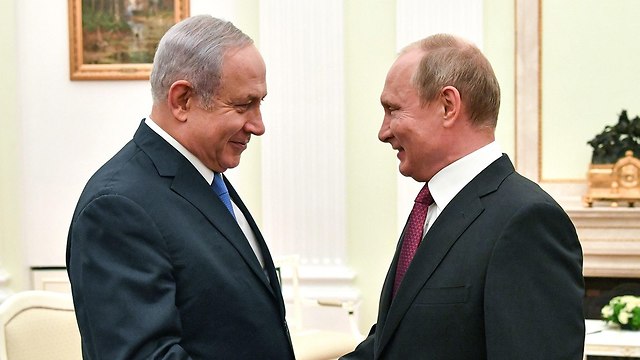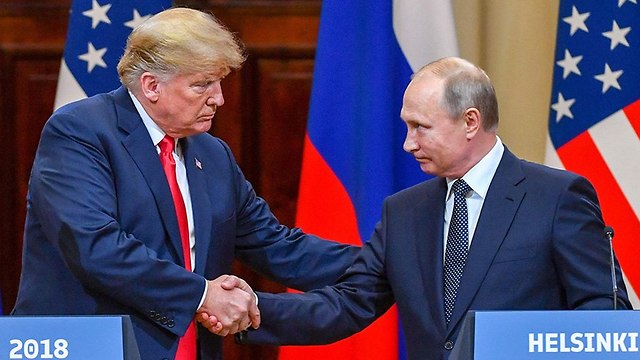

Russia: We are not interfering in Israeli elections, don't read Israeli media
Kremlin spokesman responds to warning by Shin Bet chief that foreign nation intended to launch cyber attacks in order to influence Israel's April 9 vote; security service it is more than capable of fending off cyber attacks.
The comments came a day after the Israeli media quoted the director of the Shin Bet domestic security service, Nadav Argaman, as warning against the meddling of a foreign country in the April 9 elections, saying the move could influence the elections' outcome.
"Russia is not intefering and does not intend to interfere in the elections in any country in the world," Kremlin spokesman Dimitri Paskov told reporters. According to Russian daily Izvestia, also said that people should "not read the Israeli media."
Speaking at a Friends of Tel Aviv University conference on Monday, Argaman said that a foreign country intended to launch cyber attacks in order to influence Israel's general elections.
Argaman did not say for whose benefit the alleged meddling was being done. Fingers were quickly pointed toward Russia, which is accused of trying to influence the 2016 American election in favor of Donald Trump, the Brexit campaign in the United Kingdom and other recent European elections.
"We demand that the security forces make sure Putin doesn't steal the election for his friend, the dictator Bibi," said Tamar Zandberg, head of the dovish Meretz party, referring to Prime Minister Benjamin Netanyahu by his nickname.
Netanyahu has grown closer to Russian President Vladimir Putin in recent years. But Netanyahu is far ahead in the polls at the moment, and does not appear to need any outside help.
When asked about the identity of the foreign country meddling in the upcoming elections, the prime minister declined to provide an answer.
Netanyahu, however, added that "Israel is prepared for any scenario and has the abilities to thwart any possible cyber interference in the April elections. No country is more prepared than we are (to face this threat)."
Initial reports about Argaman's comments were placed under a military gag order that was later lifted, though the naming of the country in question is still prohibited.
"I don’t know in favor of whom or against whom the foreign country will interfere. At this point, I cannot say which political interest plays a role here, however, a foreign country will attempt to meddle in the April elections and I know what I'm talking about," the Shin Bet director said.
The Shin Bet also later said in a statement that Israel was more than capabale of fending off any attempts to sway the outcome of the elections.
"The Shin Bet would like to make clear that the State of Israel and the intelligence community have the tools and capabilities to identify, monitor and thwart foreign influence efforts, should there be any," it said. "The Israeli defense apparatus is able to guarantee democratic and free elections are held in Israel."
State Comptroller Yosef Shapira said earlier Tuesday that his office was already planning to conduct a comprehensive examination of the issue of cybersecurity in relation to the upcoming elections.
According to Shapira, the primaries and election campaign for the 21st Knesset poses a new, important challenge, since part of the election campaign is run on websites and social media.
"(Examining this issue) is a difficult challenge, however, we must adjust ourselves to the times we live in order to stay relevant," Shapira said.
Israel is a cyber superpower with a governmental cyber defense body. It still uses paper ballots on election day rather than digital systems, so it would seem better prepared for a potential offensive than others. But it could still be vulnerable to other types of pre-election intervention, like hacking into party databases, spreading disinformation through social media and leaking personal and embarrassing material on the candidates, said Tehilla Shwartz Altshuler, an expert on technology policy at the non-partisan Israel Democracy Institute.
"Russia is trying throughout all the Western countries to undermine the public's trust in liberal democracy," she said. "There is no doubt they will try to do here what they have done in other countries."
The Israeli warning came just days after Twitter suspended an account that posted links to sensitive personal data and documents stolen by a hacker from hundreds of German public figures and politicians -- from every political party but the far-right Alternative for Germany.
Election interference has been high on the international agenda ever since America's 2016 presidential election, in which Russian hackers stole and published more than 150,000 emails from various Democratic targets in what US spymasters and senior lawmakers have described as a wide-ranging effort to help elect Trump. But evidence for a continued Russian interference campaign has been ambiguous at best.
Digital security companies found some evidence that Russian spies were targeting lawmakers ahead of the country's midterm elections last year, but experts said that is business-as-usual in the espionage world and there was no repeat of the spectacular leaks that preceded Trump's victory. French authorities have said they have no evidence that a mysterious leak of French emails just ahead of President Emmanuel Macron's election in 2017 was linked to Moscow. German authorities have said the recent e-mail dump that affected hundreds of public figures there has been claimed by a live-at-home 20-year-old who says he acted alone.
Shwartz Altshuler said Israel's major systems appeared safe, but that outside companies working for various parties had the same kind of resources as those allegedly working for Russia to sow havoc in a campaign. She called for tougher laws to be passed against politically-driven cyber activity.
"We are a start-up nation when it comes to technology but we are behind the curve in terms of digital legislation," she said.


















